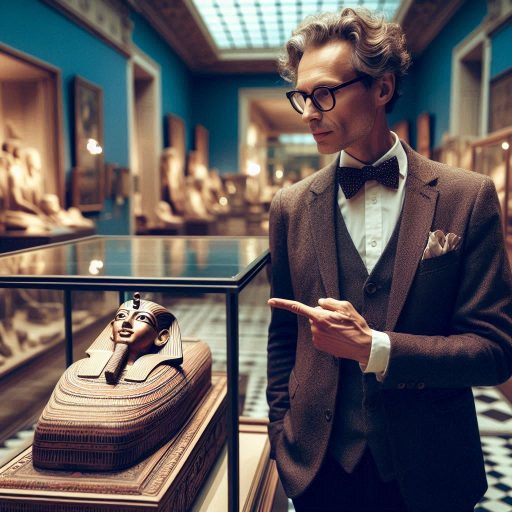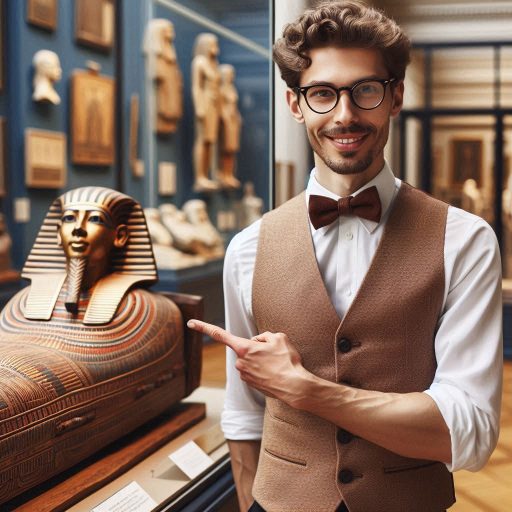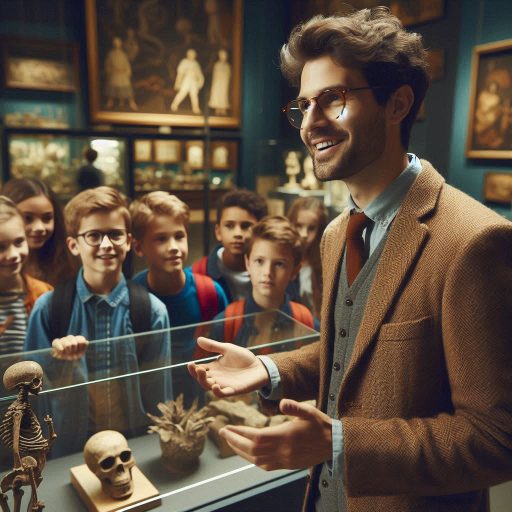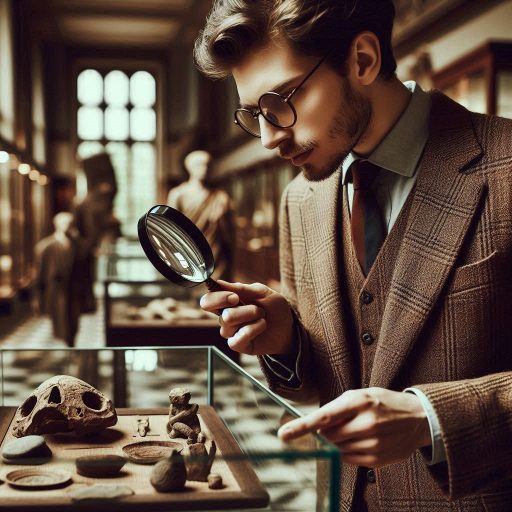Introduction
A museum curator is a professional who manages a museum‘s collection and exhibitions.
Their role involves acquiring, preserving, and interpreting artifacts and artworks.
Curators research items and create engaging narratives for visitors.
They also develop educational programs that make cultural heritage accessible to the public.
Career growth and development are vital for museum curators.
The museum sector continuously evolves due to technological advancements and shifting audience expectations.
Curators must adapt to these changes to remain effective in their roles.
This adaptability enhances individual careers and strengthens the overall relevance of museums in society.
Curators can explore various pathways to advance their careers.
Pursuing additional education in museum studies or art history is one option.
Specialized training in conservation or digital curation can enhance career prospects.
Seeking leadership roles within museums offers further opportunities for advancement.
Continuous learning helps curators better serve their institutions and communities.
By committing to professional development, they can create more dynamic museum experiences.
These experiences resonate with diverse audiences and reflect the cultural richness of their communities.
Ultimately, fostering career growth enables curators to preserve heritage for future generations and enrich the public’s understanding of history.
Education and Training
Typical Educational Background Needed to Become a Museum Curator
To become a successful museum curator, you typically need a solid educational foundation.
Most curators hold at least a master‘s degree in museum studies, art history, or a related field.
Some may even pursue a Ph.D. in a specific area of expertise, such as anthropology or archaeology.
This advanced education equips curators with essential knowledge and research skills.
Specialized Training or Certifications That May Be Beneficial
Specialized training can also enhance a curator’s qualifications.
Many universities offer programs specifically designed for museum professionals.
These programs often cover topics like exhibition design, collections management, and preservation techniques.
Gaining practical experience through internships or volunteer positions in museums provides invaluable hands-on learning opportunities.
Certifications can further set you apart in the competitive job market.
Organizations like the American Alliance of Museums (AAM) offer certification programs for museum professionals.
Earning these credentials demonstrates your commitment to the field and your expertise in museum practices.
Some institutions also provide specialized workshops and seminars.
Participating in these programs can help you stay current with industry trends and standards.
Importance of Continuing Education in the Field
Continuing education is crucial for museum curators.
The field of museum studies is constantly evolving.
New technologies, methodologies, and theories emerge regularly.
Curators must stay informed about these changes to remain effective in their roles.
Attending conferences, webinars, and professional development courses is essential.
These events allow curators to network with peers and learn from industry leaders.
Engaging in lifelong learning is important in the curator profession.
Many curators pursue additional training in digital curation, for example.
This skill set is increasingly valuable as museums expand their online presence.
Learning about digital archiving and online exhibitions can enhance your career prospects.
Additionally, participating in local and national museum associations can provide further educational opportunities.
These associations often offer workshops, lectures, and networking events.
They can connect you with mentors who can guide your professional development.
Finally, developing a diverse skill set can enhance your career growth as a museum curator.
Consider courses in management, marketing, or public relations.
These skills can improve your effectiveness in managing exhibitions and engaging with the public.
A strong educational background is vital for aspiring museum curators.
Advanced degrees, specialized training, and certifications can enhance your qualifications.
Continuing education ensures you remain current in this dynamic field.
By investing in your education and skills, you position yourself for success in your curatorial career.
Embrace lifelong learning, and you will find many opportunities for growth and advancement in the museum world.
Read: Top Skills Needed for a Successful Character Designer
Gain Experience
Value of Gaining Hands-On Experience in Museums
Gaining hands-on experience is crucial for aspiring museum curators.
Practical experience provides insights that classroom learning cannot replicate.
Working in a museum environment exposes you to real-world challenges and best practices.
It allows you to understand the inner workings of exhibitions, collections, and visitor engagement.
This experience builds confidence and prepares you for future roles in curatorial management.
Internships, Volunteer Opportunities, or Entry-Level Positions
Internships serve as one of the best pathways to gaining practical experience.
Many museums offer internship programs designed for students or recent graduates.
These positions often provide direct involvement in curatorial tasks, exhibition planning, and research.
Even unpaid internships can offer invaluable experience and professional connections.
Volunteer opportunities also play a significant role in your career development.
Many museums rely on volunteers to assist with various functions.
These roles can include organizing events, guiding tours, or helping with educational programs.
Volunteering allows you to network with museum professionals while gaining practical skills.
Entry-level positions, such as collections assistants or education coordinators, provide additional experience.
These roles often involve hands-on work with artifacts, exhibit preparation, or community outreach.
Entry-level jobs can serve as stepping stones to more advanced curatorial positions.
Skills and Knowledge Acquired Through Practical Experience
Through practical experience, you can acquire several key skills and knowledge areas.
First, you will develop strong organizational skills.
Managing collections, planning exhibits, and coordinating events require excellent attention to detail.
These skills are essential for curatorial success.
Second, you will gain valuable communication skills.
Working with diverse audiences, colleagues, and stakeholders improves your ability to convey ideas effectively.
Whether leading tours or giving presentations, clear communication is vital in the museum field.
Third, you will learn project management techniques.
Curating exhibitions involves numerous moving parts, including budgeting, scheduling, and logistics.
Gaining experience in these areas enhances your ability to manage multiple tasks simultaneously.
Additionally, you will acquire research skills.
Curators often engage in extensive research to understand the context of artifacts and develop exhibition themes.
Hands-on experience allows you to practice these skills and understand their importance in curatorial work.
Finally, you will build a professional network.
Connecting with other museum professionals can open doors for future job opportunities.
These relationships can also provide mentorship and guidance throughout your career.
Gaining hands-on experience is vital for aspiring museum curators.
Internships, volunteer opportunities, and entry-level positions provide valuable insights into museum operations.
The skills and knowledge acquired through practical experience are essential for success in the field.
Embrace these opportunities to enhance your curatorial career and prepare for future challenges.
Read: Career Paths in Ceramic Art and Design
Develop Specialized Skills
Key Skills Needed for Success as a Museum Curator
To excel as a museum curator, you must develop several key skills.
Research skills are essential for curators.
They enable you to investigate the historical and cultural context of artifacts.
Effective research also informs exhibition development and educational programming.
Communication skills are equally crucial.
Curators interact with various stakeholders, including artists, historians, and the public.
You must articulate complex ideas clearly and engage diverse audiences.
Strong communication helps foster connections and encourages public interest in museum offerings.
Attention to detail is vital in curatorial work.
Curators handle valuable artifacts, and even minor mistakes can lead to significant consequences.
Meticulousness in cataloging, preserving, and exhibiting items is essential to maintaining their integrity.
Attention to detail also applies to writing exhibition texts and labels, ensuring accurate information is conveyed to visitors.
Ways to Hone Specialized Skills
There are many ways to enhance these essential skills.
Workshops and seminars offer targeted training on specific topics.
Many museums and professional organizations host events focused on curatorial practices, research methodologies, and public engagement.
Participating in these events allows you to learn from industry experts and gain practical insights.
Online courses are another valuable resource for skill development.
Numerous platforms offer courses on research techniques, museum education, and curation.
These courses often provide flexibility, allowing you to learn at your own pace.
Engaging in online learning can help you build a comprehensive skill set relevant to your curatorial career.
Mentorship is also an effective way to hone your skills.
Seek guidance from experienced curators who can provide valuable feedback.
A mentor can help you navigate challenges, share industry insights, and support your professional growth.
Impact of Specialized Skills on Career Advancement
Developing specialized skills can significantly impact your career advancement as a museum curator.
Employers often seek candidates with proven skills in research, communication, and attention to detail.
Demonstrating expertise in these areas can set you apart from other applicants in a competitive job market.
Moreover, specialized skills enhance your ability to manage exhibitions and engage with audiences effectively.
A curator with strong communication and research skills can create compelling narratives for exhibitions.
This ability leads to increased visitor engagement and satisfaction, further establishing your reputation in the field.
Specialized skills can also open doors to leadership opportunities.
As you build your expertise, you may be considered for more advanced curatorial positions.
Curators with well-developed skills are often tasked with leading projects, managing teams, or mentoring junior staff.
Developing specialized skills is essential for success as a museum curator.
Research, communication, and attention to detail are critical competencies to cultivate.
Engaging in workshops, seminars, and online courses can enhance these skills, leading to career advancement.
As you invest in your professional development, you position yourself for greater success and opportunities in the museum field.
Read: Freelance Character Design: How to Get Started
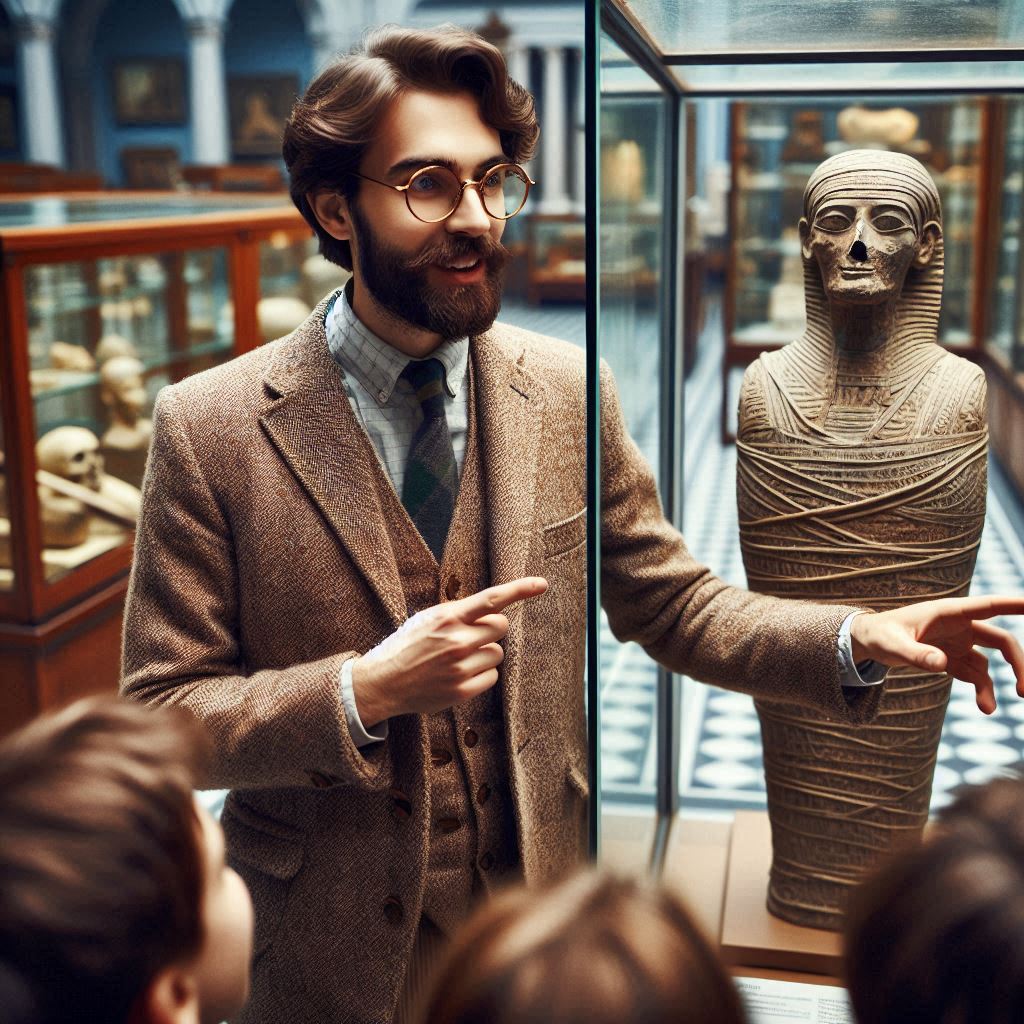
Networking
Importance of Building a Professional Network
Building a professional network within the museum industry is essential for aspiring curators.
A robust network opens doors to various opportunities, including job openings, internships, and collaborations.
Networking fosters relationships with peers, mentors, and industry leaders who can provide guidance and support.
Additionally, having a strong network enhances your visibility in the field, making you more likely to be considered for roles and projects.
Tips for Networking Effectively
To network effectively, consider the following strategies:
Attend Conferences and Workshops
Participate in industry conferences and workshops to meet fellow professionals.
These events offer valuable networking opportunities and the chance to learn about the latest trends in museum practices.
Engage in discussions, ask questions, and connect with speakers and attendees.
Join Professional Organizations
Become a member of organizations such as the American Alliance of Museums (AAM) or regional museum associations.
Membership often includes access to exclusive events, resources, and networking opportunities.
These organizations also provide platforms to connect with professionals in your field.
Utilize Social Media
Leverage platforms like LinkedIn, Twitter, and Instagram to connect with industry peers.
Follow museum professionals and organizations, and engage with their content.
Share your insights, projects, and interests to establish your online presence.
Volunteer for Museum Events
Participating in museum events as a volunteer can help you meet professionals while gaining hands-on experience.
Use this opportunity to connect with staff and fellow volunteers, showcasing your dedication and enthusiasm for the field.
Conduct Informational Interviews
Reach out to professionals for informational interviews.
These conversations provide insights into their career paths and experiences.
Approach them respectfully and express genuine interest in their work.
This can lead to mentorship opportunities and valuable advice.
Transform Your Career Today
Unlock a personalized career strategy that drives real results. Get tailored advice and a roadmap designed just for you.
Start NowBenefits of Networking for Career Growth
Networking offers numerous benefits for career growth as a museum curator.
First, it increases your access to job opportunities.
Many positions are filled through referrals and personal connections rather than traditional job postings.
A strong network can provide insider information about openings and recommendations to hiring managers.
Second, networking enhances your knowledge of industry trends and best practices.
Engaging with experienced professionals allows you to learn from their experiences.
This knowledge can inform your work and help you adapt to changes in the museum landscape.
Third, networking can lead to collaborative projects and partnerships.
Building relationships with artists, educators, and other curators can result in exciting opportunities to develop exhibitions or programs.
Collaborative efforts can enrich your experience and expand your professional reach.
Finally, networking fosters a sense of community and support within the museum field.
Establishing connections with others who share your passion can be motivating and inspiring.
Your network can provide encouragement, share challenges, and celebrate achievements along your career journey.
Networking is crucial for advancing as a museum curator.
Building a professional network can lead to job opportunities, collaborations, and valuable industry insights.
By attending conferences, joining organizations, and engaging on social media, you can expand your connections.
Embrace networking as a powerful tool for your career growth and success in the museum field.
Read: Career Paths: Becoming a Professional Character Designer
Seek Mentorship
Value of Finding a Mentor in the Museum Field
Finding a mentor in the museum field is invaluable for career development.
A mentor offers guidance, support, and insight into navigating the complexities of the museum profession.
They can share their experiences, helping you avoid common pitfalls and make informed decisions.
A mentor’s perspective can also provide clarity when you face challenges or uncertainty in your career path.
Having a mentor allows you to expand your professional network.
Mentors often introduce you to their connections, opening doors to new opportunities.
This expanded network can lead to internships, job openings, and collaborative projects.
Ultimately, a mentor can help you gain a deeper understanding of the museum landscape.
How Mentorship Guides Career Advancement
Mentorship plays a crucial role in career advancement.
A mentor can help you set realistic goals and identify the steps needed to achieve them.
They can provide feedback on your work, helping you improve and grow in your role.
This constructive criticism is vital for personal and professional development.
Moreover, mentors often share valuable industry insights that can guide your career choices.
They can help you identify emerging trends and skills that are in demand.
Understanding these trends allows you to position yourself strategically for future opportunities.
Mentorship can also boost your confidence.
As you receive guidance and support, you‘ll feel more equipped to tackle challenges.
This increased confidence can enhance your performance and make you more competitive in the job market.
Suggestions for Finding a Mentor
Finding the right mentor requires a proactive approach.
Start by reaching out to professionals in your existing network.
Informational interviews can help you identify potential mentors.
Ask if they would be willing to guide you or recommend someone who might be a good fit.
Participate in conferences, workshops, and museum events to meet potential mentors.
Engaging with speakers and attendees can lead to meaningful connections.
Express your interest in learning from their experiences.
Becoming a member of museum associations can also help connect you with experienced professionals willing to mentor aspiring curators.
Platforms like LinkedIn can assist you in finding and connecting with potential mentors.
Follow industry leaders, engage with their content, and reach out with a polite message expressing your admiration for their work.
Establishing a Successful Mentorship Relationship
To establish a successful mentorship relationship, be clear about your goals and expectations.
Communicate what you hope to achieve from the mentorship.
This clarity will help your mentor tailor their guidance to your needs.
Be respectful of your mentor‘s time.
Schedule regular meetings and be prepared with questions or topics for discussion.
Show appreciation for their guidance and acknowledge their contributions to your growth.
Additionally, maintain an open line of communication.
Provide updates on your progress and share successes.
This practice fosters a positive relationship and shows your mentor that their support is making a difference.
Seeking mentorship is essential for advancing as a museum curator.
A mentor can provide invaluable guidance, insights, and connections that enhance your career development.
By proactively seeking a mentor and establishing a successful relationship, you can significantly impact your professional journey in the museum field.
Find Out More: Building a Creative Director Network Online
Gain More Insights: Educational Resources for Exhibition Designers
Stay Updated on Trends
Importance of Staying Informed
Staying informed about current trends and developments in the museum field is crucial for professional growth.
The museum landscape evolves constantly, driven by changes in technology, visitor demographics, and societal expectations.
Keeping up with these changes ensures that you remain relevant and competitive in your role as a museum curator.
By understanding emerging trends, you can better align your work with the needs and interests of your audience.
Adapting to Changes
Adapting to changes in technology is essential for enhancing visitor experiences.
Museums increasingly use digital tools to engage audiences and create interactive exhibits.
Familiarity with these technologies allows you to integrate innovative solutions into your exhibitions.
Embracing technological advancements can lead to more immersive experiences that resonate with diverse audiences.
Understanding visitor demographics is equally important.
The museum audience is becoming more diverse, with varying interests and backgrounds.
Recognizing these changes can help you tailor exhibitions and programs to meet the needs of different groups.
Adapting to demographic shifts enhances visitor engagement and fosters inclusivity.
Additionally, staying updated on museum practices helps you understand the evolving role of curators.
Modern curators often take on multifaceted responsibilities, including community engagement and educational programming.
Awareness of best practices in these areas allows you to broaden your skill set and contribute effectively to your institution.
Resources for Staying Updated
Numerous resources can help you stay updated on industry trends.
Industry publications, such as “Museum” magazine and “Curator: The Museum Journal,” offer insights into the latest developments in the field.
These publications cover a range of topics, from exhibition design to audience engagement strategies.
Regularly reading these resources keeps you informed about significant changes and innovations.
Attending conferences and workshops provides valuable networking opportunities and exposure to new ideas.
Events like the American Alliance of Museums Annual Meeting feature presentations by industry leaders.
These gatherings allow you to learn about cutting-edge practices and trends while connecting with other professionals.
Online platforms also offer valuable resources for staying informed.
Websites like the Smithsonian Institution and the Getty Research Institute provide access to articles, research, and case studies.
These online resources enable you to explore various topics at your own pace and deepen your understanding of the museum field.
Engaging with social media can further enhance your knowledge of current trends.
Following museum professionals, organizations, and thought leaders on platforms like Twitter and LinkedIn can provide real-time updates on industry news.
Participating in online discussions allows you to share ideas and gain insights from peers around the world.
Staying updated on trends is vital for success as a museum curator.
By adapting to changes in technology, visitor demographics, and museum practices, you can enhance your effectiveness and relevance.
Utilize industry publications, conferences, and online resources to stay informed and engaged in the ever-evolving museum landscape.
Embrace lifelong learning to ensure you remain at the forefront of your profession.
See Related Content: Building a Strong Storyboard Artist Resume
Pursue Leadership Opportunities
Potential for Advancement into Leadership Roles
Pursuing leadership opportunities is essential for advancing your career within museums.
As you gain experience and develop your skills, you may aspire to roles such as chief curator, museum director, or department head.
These leadership positions allow you to shape the direction of your institution and influence its impact on the community.
Advancing into leadership roles can significantly enhance your professional profile and provide a platform to implement meaningful changes.
Skills and Qualities of an Effective Leader
To be an effective leader in the museum field, you must cultivate various skills and qualities.
Strong communication skills are vital for articulating your vision and goals to your team and stakeholders.
Effective leaders listen actively, encouraging open dialogue and collaboration.
This fosters a positive work environment where team members feel valued and empowered.
Strategic thinking is another crucial quality for museum leaders.
You must be able to assess the needs of your institution and develop long-term plans to address them.
This involves analyzing trends, understanding audience demographics, and adapting to changes in the cultural landscape.
A successful leader must also be adaptable, ready to embrace new ideas and adjust strategies as necessary.
Additionally, strong organizational skills are essential for managing projects, budgets, and resources effectively.
Leaders must prioritize tasks and ensure that their team meets deadlines.
Demonstrating integrity and ethical decision-making is also critical.
Being a role model for your team can inspire trust and respect.
Seeking Leadership Opportunities
To seek out leadership opportunities, take a proactive approach.
Volunteer for projects that allow you to take on more responsibility.
Demonstrating initiative and a willingness to lead will showcase your potential to your supervisors.
Look for opportunities to lead workshops or training sessions within your institution.
This will help you build your leadership skills while contributing to your colleagues’ development.
Consider pursuing professional development programs focused on leadership.
Many organizations offer workshops or courses designed to enhance leadership capabilities within the museum sector.
Participating in these programs can provide you with valuable insights and strategies to succeed as a leader.
Networking is also crucial in identifying leadership opportunities.
Engage with professionals in your field and express your interest in advancing into leadership roles.
Attend conferences, workshops, and industry events to connect with established leaders.
These connections can provide valuable mentorship and guidance.
Additionally, seek feedback from peers and supervisors about your leadership potential.
Constructive feedback can help you identify areas for improvement and refine your approach.
Be open to growth and actively work on enhancing your leadership skills.
Pursuing leadership opportunities is vital for advancing your career as a museum curator.
By developing essential skills and qualities, you position yourself for success in leadership roles.
Take proactive steps to seek out opportunities, build your network, and continually refine your leadership abilities.
Embrace the challenge of leadership to make a meaningful impact in the museum field.
Conclusion
Advancing as a museum curator requires a multifaceted approach.
First, prioritize your education and training to build a solid foundation.
A relevant degree and specialized certifications enhance your expertise.
Gain practical experience through internships and entry-level positions to develop skills in real-world settings.
Cultivating specialized skills, such as research and communication, is essential for success.
Networking plays a crucial role in career growth.
Establish connections within the museum community to learn from experienced professionals.
Seek mentorship to receive guidance and insights tailored to your career goals.
Staying informed about trends and developments helps you adapt to changes in technology, visitor demographics, and museum practices.
Finally, actively pursue leadership opportunities to position yourself for advancement.
Continual growth and development are essential in the museum field.
The landscape is constantly evolving, and successful curators must adapt to new challenges and opportunities.
Embrace lifelong learning to stay relevant and effective in your role.
Seek out professional development programs, workshops, and industry publications to enhance your knowledge.
Take proactive steps toward your career advancement as a museum curator.
Set clear goals, engage with mentors, and seek leadership opportunities.
By committing to your professional growth, you will make meaningful contributions to your institution and the broader museum community.
Embrace the journey ahead, and strive to leave a lasting impact on the field of museum curation.
[E-Books for Sale]
The Big Book of 500 High-Paying Jobs in America: Unlock Your Earning Potential
$19.99 • 500 High-Paying Jobs • 330 pages
Explore 500 high-paying jobs in America and learn how to boost your career, earn more, and achieve success!
See All 500 High-Paying Jobs of this E-Book
1001 Professions Without a Degree: High-Paying American Jobs You Can Start Now
$19.99 • 1001 Professions Without a Degree • 174 pages
Discover 1001 high-paying jobs without a degree! Unlock career tips, skills, and success strategies for just $19.99!

